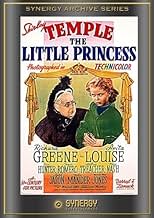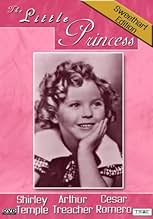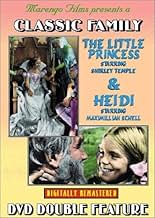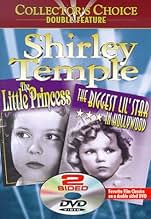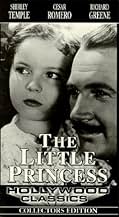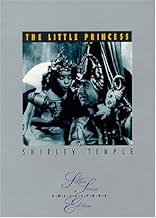A little girl is left by her father in an exclusive seminary for girls while he fights in the Second Boer War. Later, after he is presumed dead, she is forced to become a servant.A little girl is left by her father in an exclusive seminary for girls while he fights in the Second Boer War. Later, after he is presumed dead, she is forced to become a servant.A little girl is left by her father in an exclusive seminary for girls while he fights in the Second Boer War. Later, after he is presumed dead, she is forced to become a servant.
- Directors
- Writers
- Stars
- Awards
- 3 wins total
- Bobbie
- (as Keith Kenneth)
- Directors
- Writers
- All cast & crew
- Production, box office & more at IMDbPro
Featured reviews
This is a lavish technicolor delight with Shirley Temple at 12 doing an expert job as Sara, the little miss who has to bear the indignities of a boarding school once her father has been declared dead in the Boer war. The harsh mistress (Mary Nash) has her stripped of all privileges and makes her live in the attic while becoming a servant in the very household where she was once called "the little princess" by the other girls. There are departures from the novel since the script is given a "Shirley Temple formula" to ensure its success as the right vehicle for her at that time. But the addition of a dream sequence does no discernible harm, nor is the brief song-and-dance with Arthur Treacher to "The Old Kent Road" much of a distraction.
It succeeds in being a heart-warming tale of a girl's courage and determination when it seems that there is no hope of finding her father alive. The ending with Queen Victoria giving Shirley an approving nod, is an added delight. One of Shirley's best performances with a wonderful cast of supporting players: Richard Greene, Anita Louise, Mary Nash, Sybil Jason, Arthur Treacher and Cesar Romero all doing expert work.
As Sara (a Hebrew name meaning "princess"), Shirley plays her standard rags-to-riches storyline in reverse: Sara's wealthy widowed father loses everything in the Boer War, and her cruel boarding school headmistress Miss Minchin makes her an underfed, overworked servant girl to pay the tuition debt her father owed. Sara goes from luxurious rooms and private tutors to friendless, freezing attics as suddenly as the swinging America of the 1920s sank into the dust storms, breadlines, and squattervilles of the 1930's Great Depression. But where did poor Americans turn to briefly forget all these problems during the Great Depression? To the movies, where Shirley Temple, her unwavering hopefulness (as present in "The Little Princess" as in any of her movies), and her cute song-and-dance numbers -- with titles like "Laugh, You Son of a Gun" (1934), "You Gotta Smile to be Happy" (1936), "Be Optimistic" (1938), and "Come and Get Your Happiness" (1938) -- cheered up the entire nation. The same singing and dancing cheers up Sara Crewe while she's working as a galley slave in 1899 London, as Shirley performs "The Old Kent Road" with her pal Arthur Treacher (her four-time co-star).
In short, "The Little Princess" is Shirley Temple's career in a nutshell. It is a must-see film for both longtime Shirley fans and newcomers.
For the most part, it follows the familiar story, though often embellished, particularly towards the end. The story and Temple's characterization give it a rather different feel from, for example, the silent version that starred Mary Pickford. Here, Temple projects much of her own persona, with her best moments coming with Arthur Treacher, who plays the easygoing brother of the stern headmistress. The character of Becky is still significant, but Temple does not ever have the rapport with her that Pickford and Zasu Pitts had in the earlier version.
As a result, it's a bit uneven overall, but for those who enjoy this kind of story, it's still worthwhile. The public domain print makes it somewhat difficult to evaluate the production end, although it clearly contained plenty of detail and color. It's a decent if unexceptional feature whose high points are usually worth waiting for.
Shirley Temple had her last great box-office triumph in this splendid Technicolor adaptation of the Frances Hodgson Burnett childhood classic. No longer a tiny tot - she turned eleven the year THE LITTLE PRINCESS was released - but still a little trooper, Shirley exhibits once again the tremendous charm & talent which made her Hollywood's top box office draw. With wrinkled brow & tremulous lip or bouncing curls & joyous smile, she adeptly displays just the right mood or mannerism to keep the focus of the audience's attention firmly grasped in her chubby fists.
The supporting players' roster is abundantly well cast: stalwart Ian Hunter appears as Shirley's soldier father - this very fine actor wisely uses his acting skills to keep from being completely upstaged by the mighty moppet; handsome Richard Greene & lovely Anita Louise play the riding master & teacher who befriend Shirley - their roles aren't terribly significant, but they fill them quite well.
Mary Nash is once again cast as Shirley's tormentor, this time playing the evil-spirited headmistress of an exclusive girls' seminary. This accomplished actress did not appear in many films, but she could generally be counted on to provide a vivid performance - notice the relish with which she essays her small part in the medieval fantasy sequence (`I know my rights, I know the law and what I say I saw, I saw!'). Long-legged, adenoidal Arthur Treacher plays her henpecked brother; he is a delight during his two romps with Shirley to the music hall ditty Knocked Em In The Old Kent Road.'
Cesar Romero quietly portrays an Indian servant in a small, but important, role; Miles Mander & E. E. Clive both appear as hardhearted, crusty old gentlemen - only one is regenerated by film's end. Sweet Beryl Mercer makes the most of her few moments as a stately, kindhearted Queen Victoria - while Eily Malyon is a true fright as the school's slatternly cook. Marcia Mae Jones participates in one of the film's most memorable moments, when, as a particularly vile teenager, she receives a face full of fireplace ashes, courtesy of sweet Shirley.
Special attention should be given to ten-year-old South African Sybil Jason, who plays the wistful waifish charmaid who idolizes Shirley. In her American film debut, Warner's LITTLE BIG SHOT (1935), she proved wonderfully winsome & winning, but the storm of attention surrounding Miss Temple (exactly 19 months older than Miss Jason) tends, at this remove, to swamp the boats of the other female child stars of the period. However, delightful Sybil deserves to be remembered & appreciated for her own accomplishments.
The Stolen Kiss, a lavish fantasy dream sequence, provides a welcome few minutes change of pace for Temple, Nash, Louise, Greene, Treacher & Romero.
Did you know
- TriviaIn the scene where a parrot flies into Sara's room off of Ram Dass' (Cesar Romero) shoulder, originally a small monkey was to be used. However, the monkey did not seem to like Shirley Temple and kept trying to bite her, so it was replaced by a parrot.
- GoofsThere are many references in the film to receiving "mail" and "mailing" letters. The British terminology is always receiving "post" and "posting" letters.
- Quotes
Sara Crewe: Daddy?
Captain Crewe: Sara...
Sara Crewe: Daddy! Oh, Daddy! It is you! I found you! I found you! They said you were dead, but I knew you weren't! I knew you'd come back! Oh, Daddy, hold me, hold me close. You won't ever go away again, will you? Will you, Daddy? What's the matter, Daddy? Why don't you talk to me?
Captain Crewe: Sara...
Sara Crewe: Don't you know me, Daddy? I'm Sara! I'm Sara!
Captain Crewe: Sara... Where is my daughter...
Sara Crewe: Oh, Daddy! Something's happened to you! Mr. Bertie! Mr. Bertie! Oh, Daddy, you've got to know me! Look at me! Look at me! Oh, Daddy...
[sobs]
Captain Crewe: You musn't cry. You musn't cry. We must be good soldiers, you know.
Sara Crewe: But, I have been a good soldier, Daddy! And you don't know me!
Captain Crewe: My little Sara never cries...
Sara Crewe: But, I'm Sara! I'm Sara!
Captain Crewe: Sara... Sara! My little... My darling...
Sara Crewe: Oh, Daddy! You know me! You know me!
Captain Crewe: Sara, my darling! My baby Sara! Sara! Poor Sara, darling!
- ConnectionsEdited into Les Muppet Babies: Muppets Not Included (1988)
- SoundtracksThe Fantasy
Music by Samuel Pokrass
Words by Walter Bullock
Performed by Shirley Temple, Arthur Treacher, Mary Nash,
Cesar Romero, Anita Louise, Richard Greene, and unidentified extras.
Danced by Temple with unidentified ballerinas
Details
- Release date
- Country of origin
- Languages
- Also known as
- Sueño de hadas
- Filming locations
- Production company
- See more company credits at IMDbPro
Box office
- Budget
- $1,000,000 (estimated)
- Runtime1 hour 33 minutes
- Aspect ratio
- 1.37 : 1
Contribute to this page



